Patient Working Group
The MOHCCN Patient Working Group brings together people with cancer patient experiences to participate in the advancement of MOHCCN mandates. This can include people who have had a cancer diagnosis and treatments themselves, and people who have acted as a caregiver for someone with a cancer diagnosis. In either case, the cancer diagnosis must have occurred at least one year ago.
Information for potential participants
What is the Marathon of Hope Cancer Centres Network?
The vision of the Marathon of Hope Cancer Centres Network (MOHCCN) is to bring together leading cancer centres across Canada to collaborate on precision medicine developments to benefit cancer patients and drive innovation. The goal of the Network is to apply advanced technologies such as genomics, high-powered imaging, and artificial intelligence (Al) to solve complex cancer cases. The Canadian healthcare system has real advantages for collecting and sharing health data. A key objective of the MOHCCN is to unite Canadian researchers and close the gap between research in the lab and patient care in the clinic. The creation of such big data resources will allow the necessary evidence to support clinical decisions so that optimal treatments can be chosen for each patient. With the goal to create a unique cohort of 15,000 “goId-standard” cases representative of the diversity of Canadian cancer patients, we will link the genomic profiling with the clinical information available through the centres to provide vital information on health outcomes for patients treated in the ‘real world’.
What is the MOHCCN Patient Working Group?
The MOHCCN Patient Working Group brings together people with cancer patient experiences to participate in the advancement of MOHCCN mandates. This can include people who have had a cancer diagnosis and treatments themselves, and people who have acted as a caregiver for someone with a cancer diagnosis. In either case, the cancer diagnosis must have occurred at least one year ago.
The MOHCCN patient working group includes over 30 volunteers with diverse membership (i.e. ages, genders, ethnicity, educational experiences).
Meetings of the Patient Working Group are held virtually each month (approximately two meetings per month, one hour in duration).
Why become a member of the MOHCCN Patient Working Group?
MOHCCN recognizes that patient engagement and partnership play a crucial role in improving healthcare. By joining our Network, you will have the opportunity to help shape the future of precision cancer care in Canada. Patient Working Group members will
be working with researchers, physicians, and other healthcare professionals to make positive changes in healthcare for all Canadians.
This engagement will also give the opportunity to share valuable information about living with a cancer diagnosis, treatments and survivorship. If you have an interest in giving back to the community and contributing to positive change in healthcare in Canada, we encourage you to apply!
Learn more about:
- Precision Medicine
- Cancer centres
Is this limited to a specific type of cancer?
No, MOHCCN would like to extend an invitation to individuals with diverse cancer experiences.
What is the time commitment?
We ask Patient Working Group members to commit to at least four Working Group meetings with the MOHCCN Patient Working Group (Patient Working Group meetings are held monthly).
Once or twice per year, MOHCCN will aim to have a day-long hybrid (in-person & virtual) event that will include a workshop with Patient Working Group members.
What kind of tasks will Patient Working Group members be asked to do?
During meetings and workshops, Patient Working Group members may be asked to:
- Provide feedback on your own healthcare experience, as well as any topics that are brought to discuss
- Have input on project design and execution
- Read and comment on documents related to research or patient care
- Co-develop educational materials
Patient Working Group members will serve on the Patient Working Group and will be expected to attend Working Group meetings (about once every 6 weeks, virtually).
Once or twice per year, MOHCCN will aim to bring researchers and Working Group members together for hybrid (in-person & virtual) meetings and workshops.
Are specific skills required to be a member of the Patient Working Group?
We are looking to recruit individuals from a variety of backgrounds to join our Network. No professional background in health sciences is required. The following skills would be beneficial when joining the Network as a Patient Working Group member:
- Willing to make a time commitment
- Good listening skills
- Respect for other’s opinions and perspectives, even when they don’t match your own beliefs
- Ability to give helpful feedback
- Good communication skills
- Works well in a team
- Open and able to comfortably discuss healthcare experiences (positive and negative)
- Passion for improving the healthcare experience
- Ability to see beyond their own personal experiences
What if I can’t travel/attend in-person events?
Most meetings and workshops are held virtually. In-person attendance will never be mandatory for members of the Patient Working Group.
Patient Working Group: Opportunities for Participation
We are now accepting applications from interested participants who have been diagnosed and/or received treatment in Quebec.
As the membership of the patient working group moves forward and additional patient engagement activities are developed, we invite anyone interested in participating to complete the form to be contacted about MOHCCN patient engagement opportunities.
Fill out the form!
Will there be compensation offered to Patient Working Group members?
Patient Working Group members will be reimbursed for any costs related to attending meetings with the Network.
Do I need to contribute any data to the initiative?
No. Although the cancer centres participating in MOHCCN have projects with patients that are contributing data, there is no requirement for members of the Patient Working Group to contribute their data.
MOHCCN is a pan-Canadian network. As such, it is important to include the voices of patients that represent diversity in Canada, and we encourage all to apply.
Is this opportunity limited to a geographic area?
As a pan-Canadian network, MOHCCN is interested in engaging with Patient Working Group members currently residing in Canada. We particularly encourage candidates from rural communities to apply and aim to get representation from across Canada.
Is this opportunity limited to English speakers?
We encourage candidates who are not native English speakers to join our Network. A working knowledge of English is preferable in order to be able to engage with the research, which is mostly being conducted in English. We do hope to include members who speak other languages as their mother tongue, including French and Indigenous languages. If you require translation services, please let us know so we can work to accommodate your needs.
Network Voices
-

"Precision medicine gives us hope for the future"
A PALB2 mutation puts Krista Breckman at a higher risk of developing cancer. But it also provides an avenue for early detection and a possible target for new therapies. -

"It is my hope that precision medicine will help cancer patients live longer and better lives"
How genomics are empowering Rosilene on her journey with metastatic breast cancer -

How precision medicine can improve early cancer detection and interception
"Many challenges need to be overcome to better detect and treat all cancers earlier, and precision oncology will be key to surmounting them," says Dr. Nicole Beauchemin, a cancer researcher and survivor. -

“How did I beat lung cancer for eight years? Targeted therapy”
Precision medicine is saving her life, but more needs to be done for it to help others, argues Christine Wu. -

"Precision medicine has transformed my prognosis from extremely poor to hopeful"
In 2022, Yuan Lew was diagnosed with Stage IV lung cancer. As a never-smoker, Asian, female, under 50, her physicians suspected she had mutations in the EGFR gene. Confirmation that this was the case, radically altered her treatment plan. -

"Patient Partners" a poem by Bev Riediger, Patient Working Group Member
Bev Riediger, a member of the MOHCCN Patient Working Group from Winnipeg, has loved to write her entire life. She enjoys participating in weekly creative writing workshops and interacting with other amateur writers. -

"I imagine a day when we all work together to improve the lives of all persons affected by cancer"
Kirsten Efremov's cancer journey has been long and winding, but despite all the hardships she's endured, one thing is certain: she hasn't given up hope that one day, the process of detecting, diagnosing and treating cancers will be better. -

“I am optimistic for the future”
Natalie Kwadrans is hopeful that improvements in screening technologies and increased access to precision oncology will help breast cancer patients be diagnosed in earlier stages, resulting in improved outcomes for all women diagnosed with this disease. -

"I’m glad my data will play a role in bringing hope to more cancer patients"
Precision medicine has given Dan Murphy, a pancreatic cancer patient from Toronto, new hope. Now, he wants to extend that hope to other patients, by sharing his story -- and his data -- with the Network. -

"Who are you?": A Poem by Bev Riediger, Patient Working Group member
Bev Riediger, a member of the MOHCCN Patient Working Group from Winnipeg, has loved to write her entire life. She enjoys participating in weekly creative writing workshops and interacting with other amateur writers. -

"Patient Working Group": A Poem by Bev Riediger, Patient Working Group member
Bev Riediger, a member of the MOHCCN Patient Working Group from Winnipeg, has loved to write her entire life. She enjoys participating in weekly creative writing workshops and interacting with other amateur writers. -

Why I’m so excited about the potential impact of the Marathon of Hope Cancer Centres Network
A year after joining the Network, Dr. Catalina Lopez-Correa shares insights into how this national collaboration is helping to transform cancer research and care in Canada and beyond. -
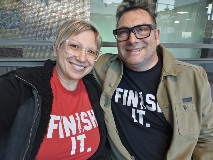
How this Manitoban cancer patient is helping FINISH Terry’s dream
Three-time cancer patient Jennifer Graham shares her cancer journey and discusses how science, community and patient engagement are helping us get closer to a day where cancer is no longer feared. -
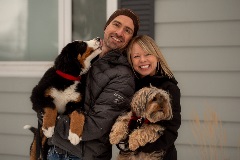
“Precision medicine provides clarity, and clarity leads to better, more confident care decisions”
Lindsay Gustafson’s cancer journey has been a rollercoaster ride. But one thing has comforted her throughout the journey: her doctors’ commitment to shape her care around her, not just her diagnosis.
Projects
Related News
-

7 ways Canadians will benefit from the Marathon of Hope Cancer Centres Network
Accelerating precision oncology lies at the heart of our plan to provide new hope to patients across Canada. By working together towards this goal, our network will help make significant progress towa... -

Innovative research program created by cancer patients is first of its kind to address gaps in precision oncology
Members of the Network's Patient Working Group have identified gaps in precision oncology and have to come up with research questions that they hope can be answered by scientists across the country. -

Meet the Team Canada of Cancer Research: A Q&A with Dr. Catalina Lopez-Correa
A Q&A with Dr. Catalina Lopez-Correa, a genomics scientist, a trained physician, an administrator, and now a cancer patient, who has been championing the use of genomics as a transformative tool i... -

New Terry Fox research program developed BY cancer patients FOR cancer patients – the first in Canada – supports ten teams addressing gaps and disparities in care, access, treatment
The program, known as the Patient Voices in Research initiative, will address current gaps in precision oncology identified by those closest to it: cancer patients, survivors and caregivers. -
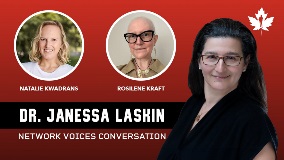
Network Voices Conversation: Janessa Laskin, Personalized Onco-Genomics program co-lead
Natalie Kwadrans and Rosilene Kraft chat with Dr. Janessa Laskin, a BC-based oncologist and researcher, about precision medicine in Canada today and how the Network is supporting projects like the Per... -

Network Voices Conversation: Kevin Wang, Oncologist and Researcher
Kirsten Efremov and Sheilah Brukewich, members of the Network's Patient Working Group, chat with Dr. Kevin Wang, an Ontario-based oncologist and researcher about rising rates of colorectal cancer amon... -
.tmb-0.jpg?Culture=en&sfvrsn=e7db4fad_1)
Network Voices Conversation: Véronique LeBlanc, Network Program Manager
Kirsten Efremov and Sarah Hunt, members of the Network's Patient Working Group, chat with Dr. Véronique LeBlanc, Network Program Manager and Scientific Writer, about the first landmark paper published... -

Marathon of Hope Cancer Centres Network publishes landmark paper in prestigious journal Cancer Cell
The Network has reached a significant milestone today with the publication of its first landmark paper in the prestigious journal, Cancer Cell. -
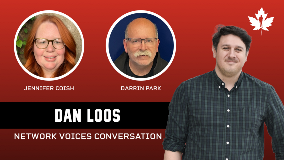
Network Voices Conversations: Dan Loos, Biobank NL
In this episode, Patient Working Group members, Jennifer Coish and Darrin Park, chat with Dan Loos, the coordinator of BioBank NL, about all things biobanking. -
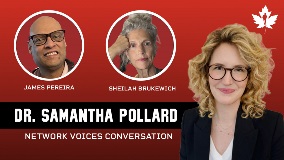
Network Voices Conversations: Dr. Samantha Pollard
Patient Working Group members, James Pereira and Sheilah Brukewich, chat with Dr. Samantha Pollard about why patient values should be at the centre of precision oncology. -

Participants needed for Patient Voices in Research Initiative study
Help shape the future of precision oncology trials. -
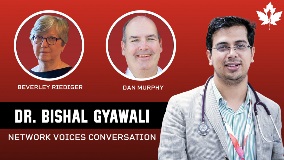
Network Voices Conversations: Dr. Bishal Gyawali
Patient Working Group members Beverley Riediger and Dan Murphy speak with Dr. Bishal Gyawali about common sense oncology.







